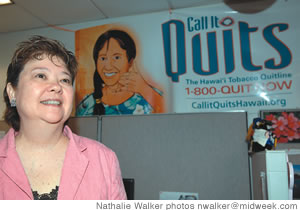Helping Smokers Call It Quits
Interviewed by Melissa Moniz
Wednesday - April 02, 2008
E-mail this story | Print this page | Comments (0) | Archive
 Del.icio.us Share
Del.icio.us Share

Dr. Cynthia Goto
Tobacco Trust Fund Cessation Consultant
Interviewed by Melissa Moniz
What’s your medical background and how did you decide to get into tobacco cessation?
I became more involved with tobacco prevention and control in relation to my professional background, which is an obstetrician/gynecologist. As part of the adult smoking population, those do include women, so in an effort to assist women to stop smoking I got more involved with this area. This is an effort to provide some guidance and assistance.
What are some smoking statistics or interesting facts people may not know?
In the state of Hawaii, we have about 170,000 adult tobacco smokers, and so those are the people we are trying to help with the Tobacco Quitline. Hawaii is actually doing quite well overall if you compare it nationally in terms of the number of smokers we have in our state, but we are always trying to bring that number down.
How has the success rate been since the start of the Quitline in 2005?
The Quitline has been very successful in reaching tobacco smokers in the state. We have reached more than 10,000 tobacco users in the state of Hawaii since the Quitline started. It is a free, confidential telephone service that helps any tobacco user in the state who calls, and provides assistance to them in helping them quit smoking.

|
What methods are used over the phone, or what type of advice is given?
The tobacco user who calls the Quitline speaks to whom we call a Quit Coach, and these people are well-trained in two proven techniques called motivational interviewing and cognitive behavior therapy. This training allows the Quit Coach to help assist people with behavior changes in terms of looking for the types of triggers that cause them to smoke, and some of the things they can do to change their behavior to help them stop smoking. Smoking is something that is difficult to stop. Smokers often try to quit many times before they actually succeed. That’s recognized, and the Quit Coaches work with the smokers to determine what their particular issues are and they help them set a quit date, and really try to meet them where they are at in the quitting process. Of course, for the tobacco users who are uninsured, if they’re eligible the Hawaii Tobacco Quitline will provide them with nicotine replacement therapy to assist them with their quit. Insured are referred to their health plan benefit for nicotine replacement therapy.
Would it be safe to say that there’s no magic formula to quit smoking and that it’s individualized?
Definitely. Everyone has different reasons why they started smoking and why they continue to smoke, so those have to be addressed for each person differently. Some people are really stressed out and some people are addicted to the nicotine. It is proven, though, that chances of quitting double when tobacco users receive both counseling and nicotine replacement therapy versus quitting on their own.
Why do you think the Quitline has been successful in helping people quit?
I think the quality of the staff has a great deal to do with it. They are very compassionate, non-judgmental, and some of the people who work at the coaching center are ex-smokers, but certainly they have not smoked for at least two years. So they are very aware of the difficulties that the smokers face in their attempt to quit.
Is Hawaii’s Quitline different from other tobacco quit phone services throughout the country?
The services are pretty similar. The Hawaii Tobacco Quitline is for the state of Hawaii, but there are Quitlines for every state. The services may differ from state to state, but the basic services of telephone counseling are probably very similar. Hawaii does provide culturally sensitive coaching for the tobacco users, so we’re very aware of the multiple cultures here in Hawaii.
Has the state ban of smoking indoors and within 20 feet of a building entrance really helped the program?
When the second-hand smoke law passed in November 2006, the calls to the Quitline actually doubled. Alot of the tobacco users who called the Quitline said that the reason that they called is because of the new law. So I think it did help to increase the awareness and encourage tobacco users to try to quit smoking.
Besides the idea of every tobacco company going out of business, which is highly unlikely, what else do you feel can be done to prevent people from ever starting to smoke?
That’s something a group here in Hawaii, called REAL, chose to highlight - the tactics that the tobacco industry uses to target the young teenage population. Many of the adult smokers started when they were teenagers, so it certainly continues to be a target for the tobacco companies. So one of the things the youths do is to educate the young people in terms of how the industry is targeting them. And that has been shown to decrease the use in teenagers, when they see that they are being used by the tobacco industry. That increasing of awareness certainly helps to prevent teenagers from starting to smoke in the first place.
Does over-the-counter nicotine replacement therapy work?
They definitely do. As I said, for the tobacco users who call the Quitline who are uninsured, the nicotine replacement therapy that is offered to them is patches and gum. So we feel that is proven to be helpful to help people quit smoking. Chances of quitting double when NRT is coupled with counseling. At the Quitline, we certainly talk to the tobacco users to determine if it is an appropriate option for them.
What is the phone number for the Quitline?
1-800-QUIT-NOW.
E-mail this story | Print this page | Comments (0) | Archive
Most Recent Comment(s):













